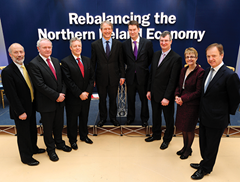Corporation tax move deferred
 Peter Cheney sums up the debate so far and the potential for a Plan B.
Peter Cheney sums up the debate so far and the potential for a Plan B.
Risks associated with Scotland’s political future have prompted David Cameron to postpone his decision on devolving corporation tax powers to Northern Ireland. The likelihood of the policy taking place is now very slim due to the short timescale available.
The Scottish independence referendum will take place on 18 September 2014 and Cameron’s approach leaves only a brief window of opportunity before the general election, due on 7 May 2015.
The Republic of Ireland’s 12.5 per cent rate was phased in between 1998 and 2003. The late George Quigley and Owen Paterson discussed how to help the North compete with the South at the US-Northern Ireland Investment Conference in April 2008.
The Economic Reform Group, led by economists Mike Smyth, Victor Hewitt, Graham Gudgin and Neil Gibson, identified how lower corporation tax could be a ‘game changer’ for the regional economy if it were rolled out alongside R&D and skills incentives. PwC Chief Economist Esmond Birnie has also emphasised that lower corporation tax should not be seen in isolation. The CBI and other business groups added their support.
Gordon Brown opposed tax devolution as he believed that it could turn the province into a tax haven. Labour has consistently been sceptical but the Conservatives were more open and pledged to consider the idea in their 2010 manifesto.
Paterson was the policy’s highest profile supporter and persuaded the Treasury to launch a consultation (March-July 2011) on rebalancing the economy with the option of devolving and cutting corporation tax.
Looking back, that was the most optimistic time for the policy. The national context changed just over a month later when the SNP won a majority in the Scottish Parliament. The Coalition Government was well aware that giving the power to Northern Ireland but not Scotland would have a political cost, as Alex Salmond would accuse Westminster of neglecting the Scottish economy.
This was a particular worry for the Liberal Democrats, who lost two-thirds of their MSPs in the 2011 election. The Chief Secretary to the Treasury, Danny Alexander, is the Lib Dem MP for Inverness and will certainly have considered the political risks. Nonetheless, a joint ministerial working group comprising Executive and UK Government ministers was formed in October 2011.
The DUP always balanced its backing for lower corporation tax with calls to protect the block grant. Its Assembly manifesto contained mixed messages, envisaging a 10 per cent rate but adding cautiously that support was “subject to the precise terms not placing an intolerable burden on our budget.”
In September 2011, Sammy Wilson announced that, even if the power were devolved, a cut would only take place after 2016. The Department of Finance and Personnel had not factored the policy into the Executive’s Budget.
The following February, Wilson told the Assembly that the devolution of “tax and tax-raising powers … lumbers Northern Ireland with all of the uncertainty in that tax revenue.” He added: “If things go badly, we suffer from the reduction in tax revenues, and to try and plan any kind of public spending programme with that kind of uncertainty built in would make life very, very difficult.”
Peter Robinson said that he was disappointed at Cameron’s decision, saying: “I don’t believe there’s any other step that can be taken which would have the same positive impact.”
Sinn Féin’s support for the policy fits in with its long-standing demand for transferring fiscal powers from London to Belfast. As a socialist party, its default position in 2005 was to increase corporation tax. The party, though, supported the South’s 12.5 per cent rate when it campaigned against the Lisbon Treaty. The UUP, SDLP and Alliance were supportive but were not involved in the negotiations.
“The delay by the Prime Minister in making a decision is disappointing but does not mean the project has been ‘put on ice’,” CBI Northern Ireland Chairman Ian Coulter said. “It is important that the business community and main political parties remain united and focused on the delivery of this key goal, which is critical to creating jobs and rebalancing the Northern Ireland economy.”
ICTU Assistant General Secretary Peter Bunting disagreed. “The debate is now settled and the advocates for a cut to 12.5 per cent have been dismissed by a Prime Minister who is ideologically inclined towards their view,” he remarked.
Way ahead
The Executive’s Economic Strategy assumed that Northern Ireland would succeed in gaining the power to vary corporation tax power. In its absence, other elements will continue including the various funding programmes for business and related reforms in planning and education.
Crucially, Theresa Villiers has said that extra help depends on the Executive making firm commitments on improving community relations.
The UK Government is prepared to offer access to the Infrastructure Guarantee Scheme (currently reserved for strategic national projects), the devolution of stamp duty, the further transfer of Ministry of Defence land to the Executive, the opening of the Funding for Lending scheme to Irish-owned banks; and the retention (by the Executive) of proceeds from enterprise zones and asset sales.
Despite the deadlock, corporation tax has been cut from 28 per cent in 2010 to 23 per cent in 2013 and is likely to fall to 20 per cent. BBC business editor Jim Fitzpatrick says that sceptics could point to this trend “and argue that the rate difference between Northern Ireland and the Republic is reducing in any event.”
The Republic, meanwhile, plans to exit its bail-out by December 2013 and the 12.5 per cent rate will contribute to its recovery. Without lower corporation tax, Northern Ireland will need to draw up a strong alternative set of policies to attract investment in an ever-changing economic world.
Critique
The lowering of corporation tax in Northern Ireland dominated economic debate in the media and often led to the perception that all parties were in favour. However, the Assembly’s smaller parties and the trade unions were openly opposed to the policy.
TUV leader Jim Allister’s objection was constitutional. Tax devolution would decentralise power from Westminster and cut the block grant. Lady Sylvia Hermon and Lord Kilclooney (John Taylor) were also opposed to further spending cuts. The Greens opposed cutting taxes for multi-nationals on ideological grounds, as did the unions.
Some of the opposition, though, came with caveats. Jim Allister supported the UK-wide lowering of corporation tax. The Green Party’s Steven Agnew wanted to reduce the rate for SMEs, which would also result in cuts to the block grant. His southern counterparts back the 12.5 per cent rate and divisions emerged in ICTU when trade unionists in the Republic supported that policy.





